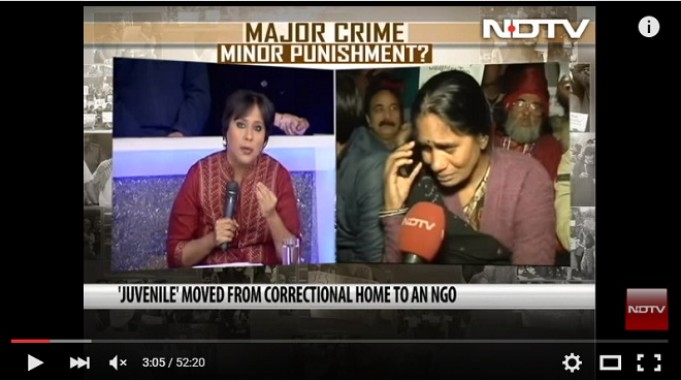Is media creating mass hysteria?
The media went to town with the theory that the juvenile was the most brutal of the six
Finally the truth is out of the closet. For three years it had been convenient for everyone-- the women groups, activists and shockingly the media---to project the juvenile involved in the gang- rape and brutal violence on December 16, 2012 as the most brutal of the gang of six.
Unfortunately, the parents of Jyoti have also been asked to say this even though they knew the truth and have been repeating this ad nauseam painting him as the villain of the century because no one challenged it.
One reason for this was the cloak of secrecy around the proceedings of the Juvenile Justice Board where the juvenile was tried. The proceeds of the Board are deliberately kept secret because it is the Board’s duty to protect the identity of the child. It is for this reason, and because of the basic premise of Indian jurisprudence to reform rather than punish, that the records of the juvenile in ‘conflict with law’ is destroyed, something which a lot of studio panelists do not understand.
As a result, the media played up the statement of Ram Singh, the driver of the bus to the police that the juvenile in their group was the most brutal and the myth has been perpetrated since them. This could not be contradicted because a juvenile is not allowed a lawyer to present his side of the story unlike the adults.
There had been some indications to this effect which were ignored. At a recent meeting of Bachpan Bachao Aandolan and Prayas, Mr. Amod Kanth, General Secretary of Prayas openly told the delegates that this was not true and actually it was Ram Singh who was the most brutal. Ram Singh had blamed the juvenile because they had a monetary dispute and he wanted to teach him a lesson. Amod Kanth knows what he is talking about because the juvenile was tried at the JJ Board situated at the Ferozshah Kotla Boys Home run by Prayas. He also stayed in this reform home for a few months. But the media chose to ignore Kanth.
In Barkha Dutt’s programme ‘We the people’ on Sunday one of the participants repeated the same thing and started telling them that the JJ Board report had clearly stated that even though the juvenile was a part of the gang he was not the most brutal, but he was not allowed to complete his sentence because the channel was running the live telecast of Asha Devi, mother of Jyoti crying for justice against the release of the juvenile who is one of the six culprits, four of whom have been awarded death, while Ram Singh committed suicide. So it is not true that no justice has been done to the family.
But this morning’s by-line story in ‘FirstPost’ should be a collectors item for journalists and shame them for perpetuating a dangerous myth, and creating lynch mobs ready to kill the juvenile because they did not work hard enough to uncover the truth.
The FirstPost reporter Tarique Anwar claims that they have in their possession “the original FIR, the police chargesheet, testimony of both the girl and her male friend and the records of the Juvenile Justice Board. FirstPost is in possession of copies of these.”
The report clearly states that the story of the juvenile being the most brutal had been debunked by the JJ Board. It mentions that this angle had not been mentioned either in the FIR of the police or the two statements of Jyoti and his companion that night. The headline of the story is, “Juvenile Justice Board rules Delhi gangrape convict 'not the most brutal'; was brutalised by his depiction.” (emphasis mine.)
The report does not in any was lessen the crime of the juvenile both in the gang rape and the violence but it does say categorically that he was not the ‘most brutal.’ The report has said that the most brutal of the six culprits were Ram Singh, who later committed suicide and another co-accused Akshaya Kumar alias ‘Thakur’.
Actually the Magistrate who tried him told people close to him that there was not much evidence against the boy but he was being kept in the Juvenile Home to protect him from being lynched by mobs who had been taken in by the story of his being the cruelest. He himself was scared of this that is why he wrote to the authorities that he was scared of going out of the Home.
Questions are being raised as to who knows whether he is reformed sufficiently. Technically this report has to come from the Juvenile Justice Board. But in this case one good conduct report about his conduct did appear in the Hindustan Times about three months back but it backfired because it said that he had turned religious and was performing Namaz five times a day.
Disclosing of the religion of the juvenile under reformation, which again is not permitted, gave the issue a new twist and vested interests started portraying him as a Jehadi. It was alleged that the Intelligence Bureau had a report against him and if he was let off under the Juvenile law he would be detained for being a Jehadi.
But the fact that neither the High Court nor the Supreme Court found anything in law to detain him proves that the IB had not given any such report and this was the figment of some people’s imagination.
Amitabh Srivastava has worked with the Hindustan Times group for 27 years, and with the Sahara Times. He is now a freelance journalist. He recently worked for a year with Prayas as a media advisor which gave him an insight into the world of juveniles who encounter the justice system.







